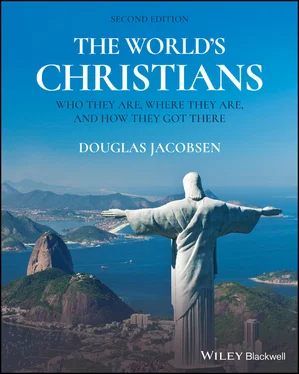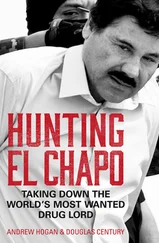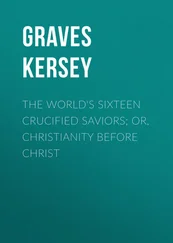The same kind of overlap between the physical and the spiritual that undergirds Pentecostalism’s belief in healing also defines the prosperity gospel , which in recent decades has become ever more prominent in global Pentecostalism. Every week, literally thousands of Spirit‐filled preachers tell their followers that God wants them to be rich. The standard message is something like this: if you want a nice house or a new car or fashionable clothing, you have the right to claim those things in Jesus’s name, and God will give them to you. The key is to step forth in faith, and the typical recommendation is to demonstrate that faith by donating a “seed offering” to the preacher’s own church. This seed offering, which is often a substantial portion of a poor person’s total assets, will show God the sincerity of one’s faith, and God will then grant the individual – some preachers say God is obligated to provide – a bounteous harvest of wealth.
Voices of World Christianity 4.2 Kathryn Kuhlman on Health and Healing
 Kathryn Kuhlman(1907–76) was one of the most well‐known twentieth‐century Pentecostal preachers, and much of her fame was based on her reputation as a faith healer. She was, however, a faith healer with a difference. Rather than demanding that her followers reject modern medicine, she exuded a kind of reasonableness about healing that appealed to Pentecostal and non‐Pentecostal Christians alike, and her winsome style helped Pentecostalism move out of the shadows and into the religious mainstream. During the mid‐century when Kuhlman’s ministry was at its peak, Pentecostalism was still often equated with “hillbilly” religion – a faith for people at the margins of polite society who dressed badly, sang too loudly, and were a little off kilter in general. Kuhlman provided a very different image for the movement. She dressed glamorously and talked like a TV host (which she was), and she made miracles and speaking in tongues seem normal. The religious normalcy that Kuhlman infused into the movement attracted millions of followers who otherwise may never have taken Pentecostalism seriously.
Kathryn Kuhlman(1907–76) was one of the most well‐known twentieth‐century Pentecostal preachers, and much of her fame was based on her reputation as a faith healer. She was, however, a faith healer with a difference. Rather than demanding that her followers reject modern medicine, she exuded a kind of reasonableness about healing that appealed to Pentecostal and non‐Pentecostal Christians alike, and her winsome style helped Pentecostalism move out of the shadows and into the religious mainstream. During the mid‐century when Kuhlman’s ministry was at its peak, Pentecostalism was still often equated with “hillbilly” religion – a faith for people at the margins of polite society who dressed badly, sang too loudly, and were a little off kilter in general. Kuhlman provided a very different image for the movement. She dressed glamorously and talked like a TV host (which she was), and she made miracles and speaking in tongues seem normal. The religious normalcy that Kuhlman infused into the movement attracted millions of followers who otherwise may never have taken Pentecostalism seriously.
Excerpt from I Believe in Miracles (1962):
If you believe I am against the medical profession, against doctors, against the use of medicine because I believe in the power of prayer and the power of God to heal – you are wrong. Had I chosen a profession, in all probability my choice would have been either medicine or law. But I had no choice: I was called of God to preach the Gospel…
Any truth, no matter how valid, if emphasized to the exclusion of other truths of equal importance, is practical error. My faith in the power of God is the same as that exercised by any physician or surgeon when he believes in the healing and the curing of his patient. He waits for nature (God) to heal gradually, while I believe that God has the ability to heal, not only through a gradual process, but should He so will, His is the ability and the power to heal instantly … I believe that God has the power to heal instantly without the material tools of scientific medicine; but I also believe that God gave us our brains to use! … [So] if you are ill, and have not yet received the gift of faith so that you believe in miracles, then get yourself the best medical assistance possible…
If you believe that I, as an individual, have any power to heal, you are dead wrong. I have nothing to do with any miracle … All I can do is point you to the way – I can lead you to the Great Physician .
Kathryn Kuhlman, I Believe in Miracles (Alachus, FL: Bridge‐Logos, 2006), pp. 1–5.
Obviously, there is tremendous potential for charlatanism within prosperity gospel circles, and some Pentecostal preachers have accumulated massive wealth by collecting seed money from their flocks. Their success is due in part to the fact that Pentecostal Christians really do believe that God wants everyone to enjoy the good things of life. Most Pentecostal churches would advise members to avoid cheap and inappropriate pleasures because such pleasures can bring harm or sorrow in their wake, but pleasure itself is not a problem, nor is wealth. According to the Pentecostal view of the world, God wants people to flourish in every way possible, including financially. Greed is a sin, selfishness is a sin, and pride in one’s wealth can be a sin, but being wealthy is not a sin and it may, in fact, be a blessing from God.
It is important to remember the social context in which most of the world’s Pentecostals live. More than 80 percent of the world’s Pentecostal Christians live in Africa, Asia, and Latin America, and by almost any measure, most of these individuals are decidedly poor. “Prosperity” for them does not mean two BMWs in the garage and a vacation house at the beach. It means having enough food for today and possibly for tomorrow. It means having a roof that does not leak. It means obtaining a minimal level of education. It means having a job – any kind of job. When the prosperity gospel is transplanted to wealthy cultures it can appear to be nothing more than religiously sanctioned greed, but in most worldwide contexts, to be wealthy means simply not worrying every day about meeting one’s basic human needs for food, shelter, and safety. Most Pentecostals understand how easily prosperity preaching can go awry, but they also genuinely believe that God wants people to prosper. In their view, to squelch the preaching of prosperity would be to deny part of God’s message of salvation.
If there is an Achilles’ heel for the Pentecostal movement and its view of salvation, it is that all the grand promises of Christianity seem to hang by the very slender thread of human faith, and having faith – enough faith to believe in miracles – is a constant struggle in many Pentecostal circles. Lapses in belief or trust are sometimes seen as evidence that one is no longer Spirit‐filled or that one might even have “lost” one’s salvation. Taken to the extreme, these kinds of concerns can result in an almost neurotic fixation on the current vitality of one’s own faith: Is my faith sufficiently fervent to guarantee salvation and God’s continuing blessing? For some, the pressure can become simply too much to bear, and many people have left the movement for that reason. Thus, alongside the ever‐increasing numbers of Pentecostal Christians in the world, there is also a growing contingent of post‐Pentecostal Christians who have exited the movement in search of a less pressure‐packed form of faith.
Pentecostalism is a much more fluid and loosely bounded tradition than the other three Christian mega‐traditions. It has no central governing authority, and its edges are remarkably fuzzy. In the Gospel of John, the Holy Spirit is likened to the wind that blows wherever it wants without warning or predictability, and Pentecostal Christians perceive their work in the same way. Yes, they plan and plant new churches in proper organizational fashion, but Pentecostals are always on the lookout for where God’s Spirit might be leading, trying to ascertain where and how God may be calling them to new endeavors or new pathways of faith. From the very beginning, the Pentecostal movement has been entrepreneurial. People who think they have been called by God to start a new work simply go out and do it. No permission is necessary, and no consultation is expected. This partially explains why the movement has grown so quickly. But entrepreneurial enterprises also tend to produce leaders who think very highly of themselves and who have enormous egos. This too has been, and still is, a feature of the Pentecostal movement.
Читать дальше

 Kathryn Kuhlman(1907–76) was one of the most well‐known twentieth‐century Pentecostal preachers, and much of her fame was based on her reputation as a faith healer. She was, however, a faith healer with a difference. Rather than demanding that her followers reject modern medicine, she exuded a kind of reasonableness about healing that appealed to Pentecostal and non‐Pentecostal Christians alike, and her winsome style helped Pentecostalism move out of the shadows and into the religious mainstream. During the mid‐century when Kuhlman’s ministry was at its peak, Pentecostalism was still often equated with “hillbilly” religion – a faith for people at the margins of polite society who dressed badly, sang too loudly, and were a little off kilter in general. Kuhlman provided a very different image for the movement. She dressed glamorously and talked like a TV host (which she was), and she made miracles and speaking in tongues seem normal. The religious normalcy that Kuhlman infused into the movement attracted millions of followers who otherwise may never have taken Pentecostalism seriously.
Kathryn Kuhlman(1907–76) was one of the most well‐known twentieth‐century Pentecostal preachers, and much of her fame was based on her reputation as a faith healer. She was, however, a faith healer with a difference. Rather than demanding that her followers reject modern medicine, she exuded a kind of reasonableness about healing that appealed to Pentecostal and non‐Pentecostal Christians alike, and her winsome style helped Pentecostalism move out of the shadows and into the religious mainstream. During the mid‐century when Kuhlman’s ministry was at its peak, Pentecostalism was still often equated with “hillbilly” religion – a faith for people at the margins of polite society who dressed badly, sang too loudly, and were a little off kilter in general. Kuhlman provided a very different image for the movement. She dressed glamorously and talked like a TV host (which she was), and she made miracles and speaking in tongues seem normal. The religious normalcy that Kuhlman infused into the movement attracted millions of followers who otherwise may never have taken Pentecostalism seriously.










